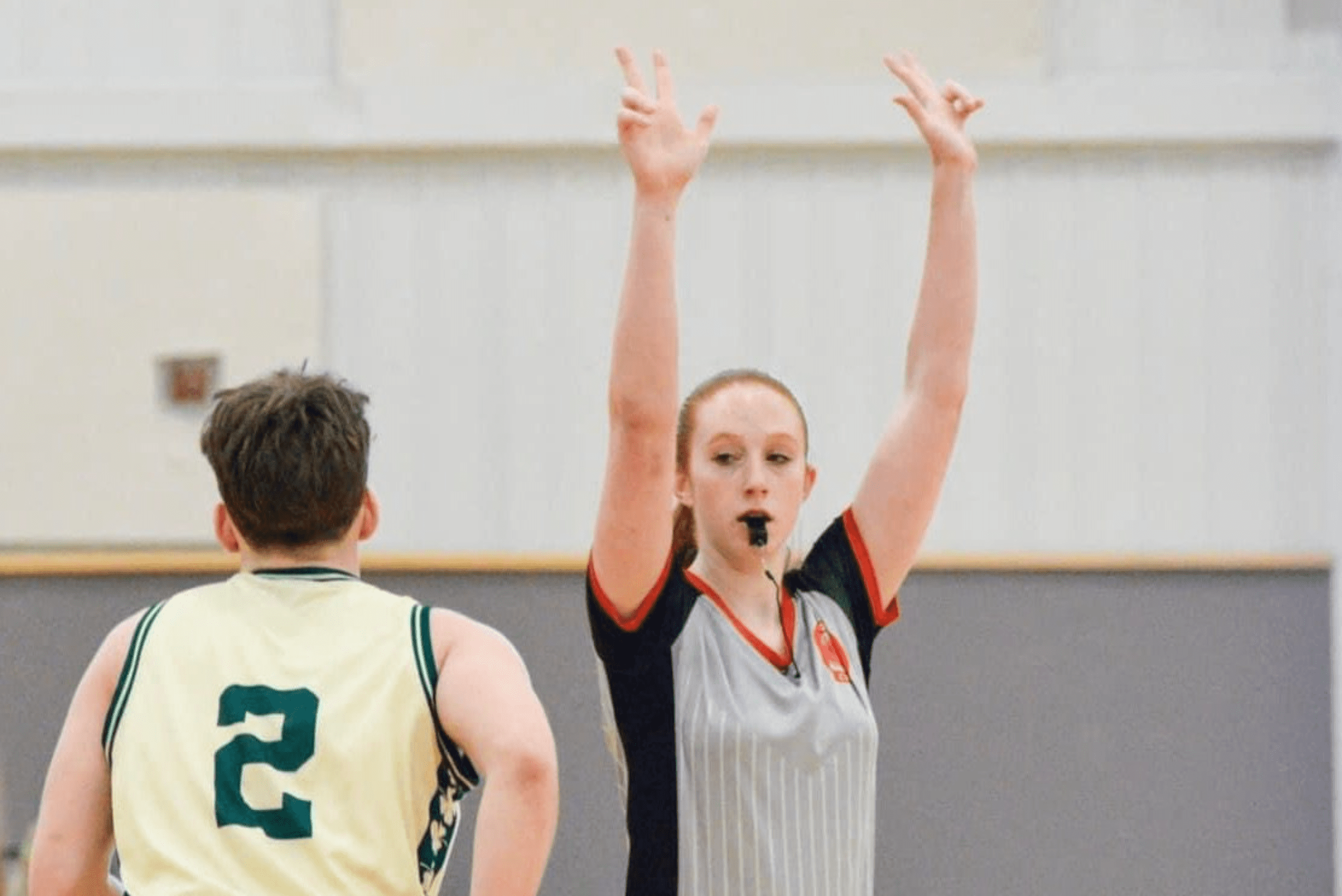
They may not have the loudest voices in the gym or the biggest presence on the field—but these teens are calling the shots, literally. At this year’s Sport Newfoundland and Labrador Awards, 3 under-18 officials were recognized for stepping up to the toughest job in sport: the one where everyone’s watching, and not always kindly. This new category celebrating youth referees and officials brought forward stories of confidence, resilience, and a fresh look at what it means to lead from the sidelines.
Introduced in 2025 by SportNL, the new award recognizes youth officials, young people who are not just playing the game, but shaping it from the sidelines, fields, and courts. It’s an acknowledgment of the behind-the-scenes roles that keep youth sport functioning and fair, and that often go unnoticed or underappreciated.
Learning the Game by Leading It
Olivia Clarke, an 18-year-old basketball official from Petty Harbour, NL, became the award’s first recipient. In her acceptance speech, Clarke thanked her dad for encouraging her to strive for excellence as both a basketball player and an official. Her story is a testament to how youth can find passion and purpose outside of simply competing, by stepping into leadership roles that demand confidence, decision-making, and calm under pressure.
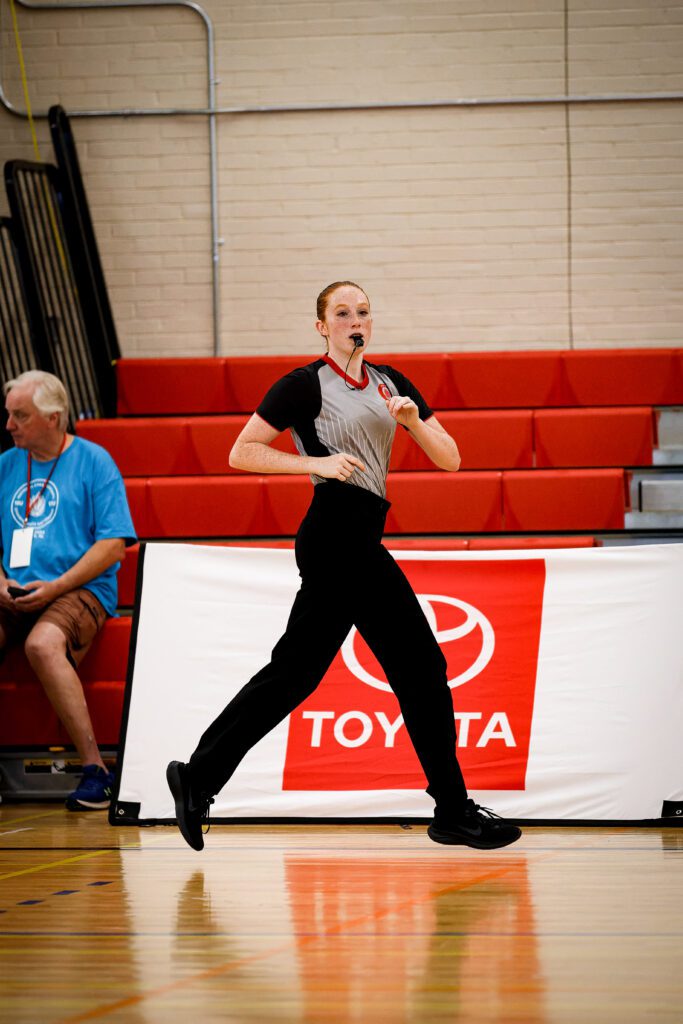
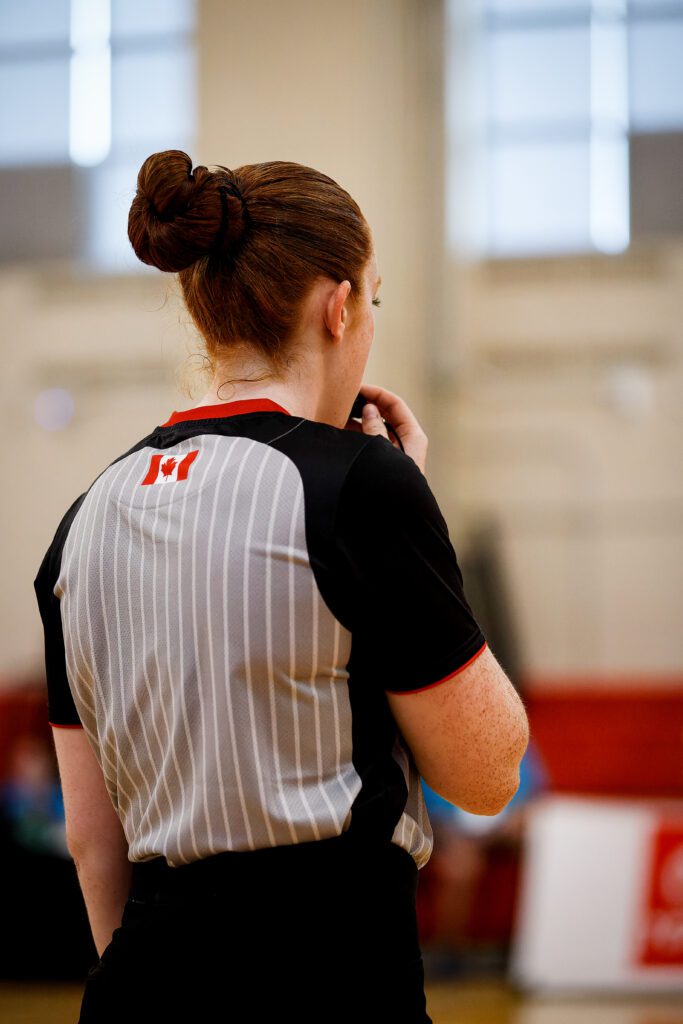
Youth officiating is a crucial part of sport across the country. It offers a way for kids and teens to stay involved in their sport beyond playing. From organizing and enforcing the rules to setting the tone for competition, officials learn life skills that go far beyond the court or field like leadership, conflict resolution, and responsibility. But while this path offers growth, it also comes with scrutiny and pressure. As more young officials like Clarke step into these roles, the question arises: are we protecting youth referees enough for the challenging terrain of officiating in sport?
Clarke started playing basketball at the age of 5. As she grew to become passionate about the sport, she admits to challenging referees on occasion during her younger years.
“I did have a tendency to complain to, and about officials,” she says. “Once I started officiating myself, I realized there are always 10 players on the court, and maybe 2 or 3 officials, so they have a lot to look at. There are a lot of moving parts and now I have so much more respect for what they do.”
At age 10, she began shadowing her father, a referee, which gave her early exposure to the officiating world. When she overheard him say that the Newfoundland and Labrador Basketball Officials Commission needed more young officials, she decided to give it a try.
Clarke says she began to have a new appreciation for not only basketball officials, but the sport itself, seeing it from the other side. She says the most rewarding aspect of officiating is being able to share her love of the sport with the players on the court.
Yet the job hasn’t always been easy.
Clarke says she’s experienced inappropriate behaviour from athletes, coaches, as well as parents and spectators. “It really difficult to navigate the game,” she says. Despite these challenges, Clarke says the most powerful asset of her tool kit as an official is knowing the rules of the game inside and out to firmly stand her ground when met with a conflict.
“‘As officials, we have a lot of coping mechanisms and protocols in place for conflict,” she explains. “I utilize the rules of the game to my advantage so there is no basis to the questions or concerns I’m receiving on the court.”
Her approach of staying grounded in the rules is both effective and admirable. But is it enough?
Dr. David Hancock, Associate Professor at Memorial University of Newfoundland and an expert in the psychology of officiating, affirms the value of Clarke’s method but emphasizes it shouldn’t be the only strategy in a young official’s toolkit. In addition to knowing the rules, Hancock says officials also need to be trained in softer skills.
He highlights 3 key tools every young official should have in their toolkit:
- Understanding of how to manage a conflict
- Understanding your own body language and reactions to conflict
- Maintain confidence and reduce doubt in heated situations
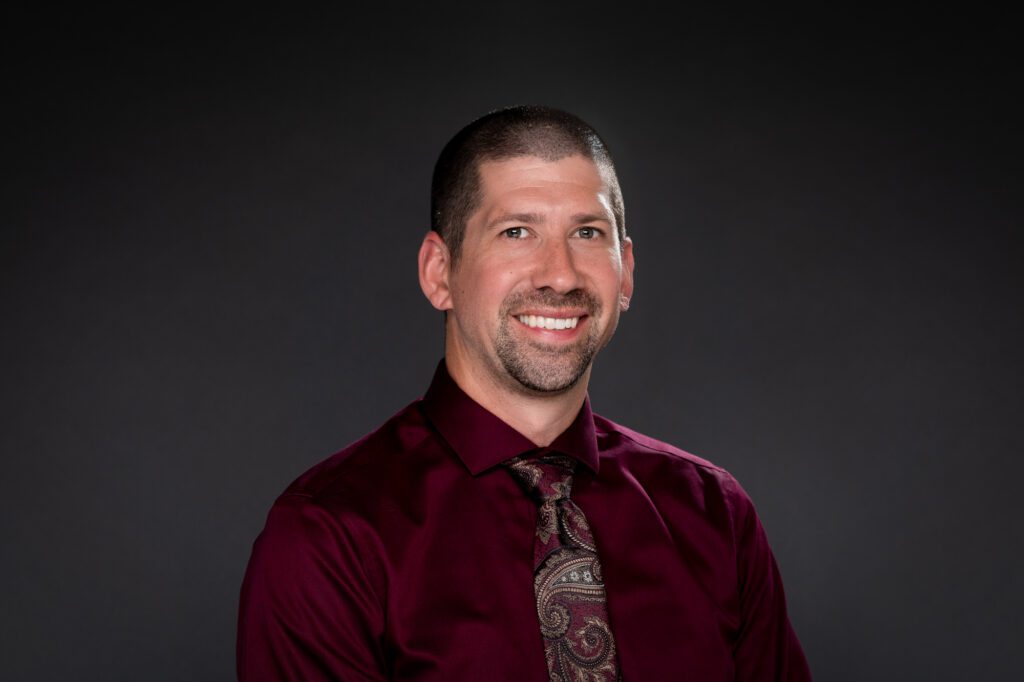
These tools—rooted in communication and mental performance—are often underemphasized in traditional officiating training. Yet they’re just as important as rule knowledge when it comes to building confidence, ensuring retention, and supporting youth in high-pressure sport environments.
Clarke is now channeling her experience into making officiating more inclusive. Her latest passion project is recruiting more female officials to join the ranks.
“I’ve learned that players feel more connected to their sport when they see people who look like them or have had similar experiences to them.”
To that end, she led the first all-female referee training camp for new officials in her region this past year. That initiative attracted 18 new youth female officials in just one day, a major step forward for representation in sport leadership.
Receiving the inaugural Junior Official of the Year award, Clarke says, was both an honour and an important recognition of the work officials do behind the scenes.
“I think it’s important to recognize officials,” she says. “People don’t understand how much work goes into being a good high-level official. That work deserves to be recognized.”
Confidence, Consistency, and Real-Time Learning
Another nominee, 18-year-old Shawna-Marie Stuckless from Corner Brook, NL, found her way into officiating through curiosity and a desire to improve as a player.
“I didn’t really understand the rules,” says Stuckless. “So, I decided to get involved so that I had a better understanding when I am playing myself.”
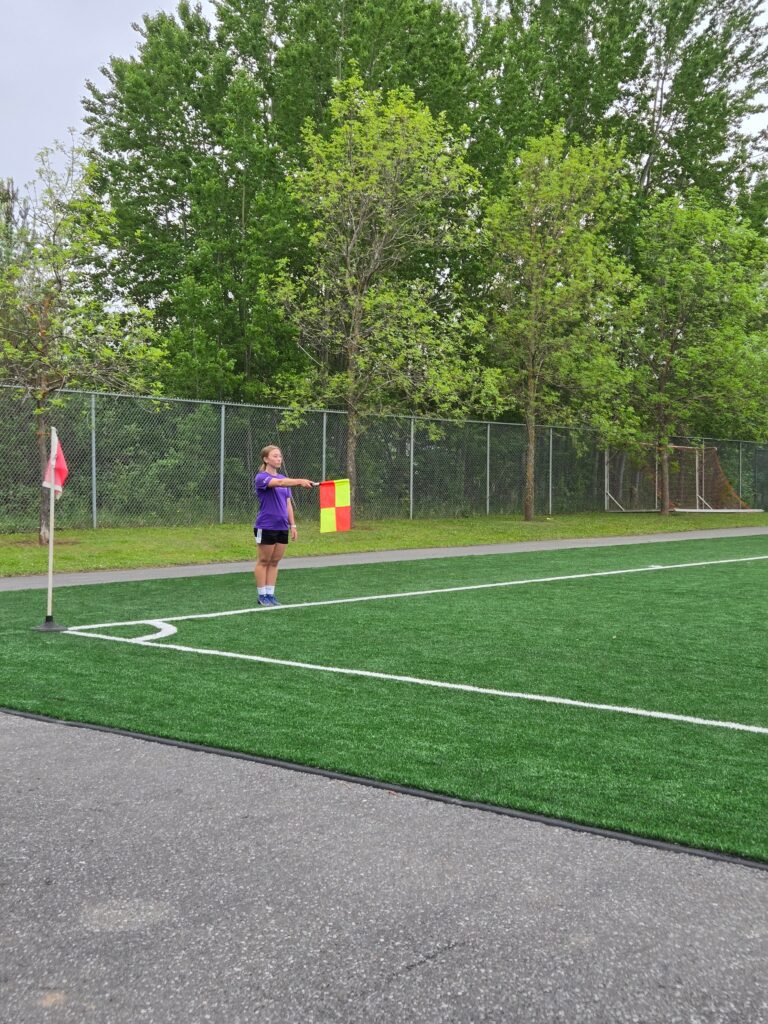
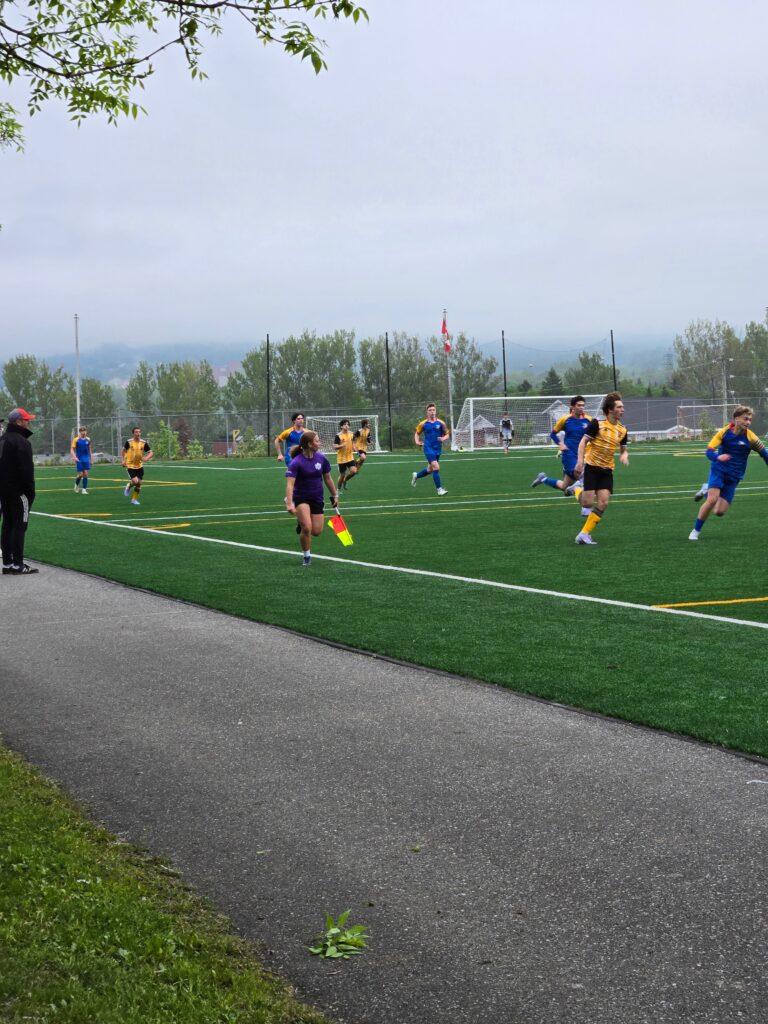
That curiosity evolved into a major commitment. Over the last 3 years, she’s officiated every age group from U11 to Senior Men’s. Her confidence and professionalism earned her the respect of the Newfoundland and Labrador Soccer Association (NLSA), who nominated her for the 2024 Junior Official of the Year.
“Don’t be fooled by her 5ft stature,” the NLSA wrote in her nomination. “Shawna-Marie shows great confidence in her calls and stands by her decisions even when in the middle of a senior men’s game.”
Like Clarke, Stuckless uses the rules to her advantage when handling pushback from players and coaches.
“I use the laws of the game to back myself up,” Stuckless says. “If someone is unsure why you made the call, just saying here’s the rule, this is why I made the call, helps back up my decision.”
Consistency is one of the most important traits for any official—and it’s a cornerstone of Stuckless’ approach.
“I think the biggest thing is staying consistent. If I made the call back there, I would need to make it again, so it is the same situation.”
Stuckless is also a member of the Purple Shirt Campaign, launched by the NLSA in 2023. The program helps retain referees by signaling to players and spectators that the official is new to the role. It’s a small but powerful visual cue that the person on the field is still learning.
During her time officiating, Stuckless has come to appreciate the nuances of working with different age groups.
“With the younger kids I can’t call everything. They are just kicking everything and there are a ton of fouls,” she says. “It’s more about making sure they want to play soccer and teaching them at the same time. Whereas the senior leagues, it’s about managing not only the game, but behaviour as well.”
Systemic Support for Youth Officials
While visual identifiers like purple shirts and green armbands help, Hancock warns they aren’t sufficient on their own.
“Is it enough to simply identify an official as a child,” he says. “Or do we need anonymous reporting systems that youth officials can use to report what’s actually happening to them?”
He also points out that education for youth officials is often lacking in depth.
“Many of these sports will have one- or two-day clinics,” says Hancock. “Often they will go over the rules of the game but there tends to be less education on policies and procedures or any mental or communications tools these young refs may need.”
While some organizations offer robust training, Hancock notes the inconsistency across provinces and sports. Many clinics take place in classrooms with no opportunity for practical experience before an official’s first game.
In many sport systems across Canada, officiating starts young. Officials can begin training as early as age 12, creating a valuable runway for skill development and long-term involvement in sport. But with ongoing officiating shortages, that early entry can also lead to young officials being placed in high-pressure roles before they’re fully prepared.
To manage this, most sport organizations at the national and provincial level will often have specific guidelines of what youth officials can officiate. In the Hockey Canada Officiating Pathway, the organization notes that Level 1 or youth officials are eligible to officiate levels of play that are one age group below their current age category. But it also allows exceptions:
“A Member may advance an official to a higher age group if they have shown a high level of skill, proficiency and maturity and is recommended by the Member officiating development program for advancement.”
While that flexibility is intended for exceptional cases, Hancock says it’s increasingly used as a workaround.
“For the most part those exceptions are supposed to be for officials who have shown a great deal of promise,” says Hancock. “But I think the reality is, with the officiating shortage, organizations are saying well we need someone. Who can we move up? Suddenly you have a 15-year-old officiating a U18 or U21 game.”
Hancock admits he wrestles with the implications himself. When asked if he would recommend officiating to young people, he thought of his son who will turn 14.
“Would I actually encourage him to become a referee?” he says. “I would, I still think there’s the benefits of being physically active, communication skills, conflict management and learning how to study and educate yourself on the rules.”
The risk, however, is discouraging or even harmful early experiences. That’s why Hancock says sport organizations must go beyond handing out rulebooks and whistles.
“Globally, I would also be challenging coaches and parents in particular to think about the consequences of your actions on youth officials,” says Dr. Hancock. “I think more education around spectator behaviour would be useful. But that goes beyond the sport official.”
For Clarke and Stuckless, officiating has done more than enhance their knowledge of the game, it’s helped shape their confidence, voice, and leadership. As more young Canadians follow their lead, the sport community has both an opportunity and a responsibility: to ensure youth officials are respected, protected, and empowered every time they step on the field.